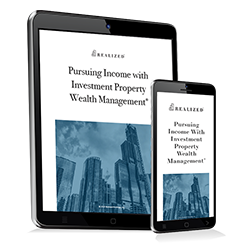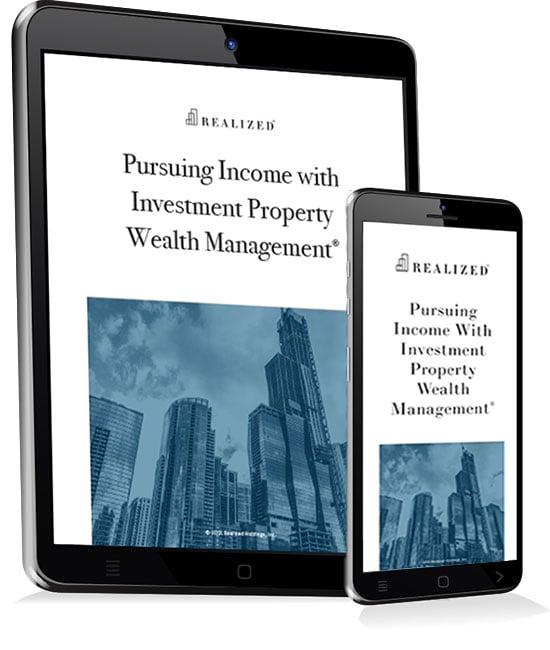 Retirement and aging can bring about a whole new set of challenges. You’ll also be living off your savings instead of drawing a regular paycheck, which can add some financial concerns since your savings may have to last two decades or more.
Retirement and aging can bring about a whole new set of challenges. You’ll also be living off your savings instead of drawing a regular paycheck, which can add some financial concerns since your savings may have to last two decades or more.
Crafting a balanced retirement portfolio can help alleviate some of those financial fears. Ideally, your retirement portfolio deftly balances two primary objectives: capital preservation and growth. Adding real estate to your retirement portfolio may help achieve both goals, but since real estate comes with a slew of unique risk factors, investors must be able to handle this additional exposure to risk during retirement, which is often the time investors shift their investing focus to more conservative asset allocation strategies.
In this article we’ll discuss some of the potential benefits and drawbacks of investing in real estate to help investors better understand the pros and cons of this asset class. After careful consideration of these factors, investors can decide for themselves if this asset class meets their investment goals and fits within their retirement investment strategies.
Potential Benefits of Investing in Real Estate
There’s no guarantee investors will realize any of these potential benefits, but a few of the reasons investors add real estate to their portfolios include:
- Tax breaks. Real property investors are able to offset some of the income from their properties through asset depreciation. Large capital expenditures that significantly improve or enhance the property, as well as common operating expenses, also can be written off. Losses from the property, meanwhile, can be used to offset the investor’s ordinary income and may result in a lower nominal tax bill.
- Diversification. Real estate can be one way to achieve higher levels of portfolio diversification. Real property investments can be further diversified by varying geographical regions, asset classes, and asset types. Real estate also isn’t directly correlated to public equities markets, so bear runs in the stock market may not have as dramatic an effect on real property values.
- Recurring income. Property ownership has the potential to provide recurring income in the form of monthly rental payments from tenants.
- Capital appreciation. Investors who buy and hold real estate for longer periods of time may realize significant asset appreciation.
Investing in real estate can take many forms, including direct property ownership, publicly traded real estate investment trusts, Delaware Statutory Trusts, and tenants in common or joint tenancy arrangements. Some of these forms allow for direct involvement in the asset, while others are completely passive investments.
Potential Drawbacks of Investing in Real Estate
Real estate investments can bring a host of potential drawbacks that may outweigh any benefits. These can include:
- High transaction costs. Buying and selling real property can include costs such as broker commissions, title insurance, loan fees, and a slew of additional transaction expenses at closing.
- Cyclical downturns. Real estate is uncorrelated to broad swings in public equities markets, but it routinely has undergone many severe and well-documented downturns that could erode property values and lead to steep losses.
- Vacancy. Vacant rental properties don't provide rental income. You also might need to pour a lot of money into the asset in the form of tenant improvements to ready the space for another tenant.
- Illiquidity. Commercial properties may change hands quite often, but there’s no guarantee you will be able to divest a real property asset at an equitable price if you suddenly need cash.
The Bottom Line
Only you can decide whether or not you should add real estate to your retirement portfolio. It could prove beneficial to allocate a percentage of your investment capital to real estate as a means to diversify your retirement portfolio, but doing so could potentially increase your exposure to risk at a time when you might want to consider more conservative investment approaches.
Investing in real estate, especially direct property ownership, can be time-consuming, complicated, and usually requires extensive due diligence and market research. Although you might find yourself with more free time in retirement, you also might not want to spend that time scouring markets for suitable investment options or managing a rental property and its tenants.
Perhaps the best approach when considering the merits or pitfalls of adding real estate to your retirement portfolio is to discuss your investment goals with a certified financial planner. That conversation could go a long way to help you determine if real estate should become part of your retirement investment strategy.
This material is for general information and educational purposes only. Information is based on data gathered from what we believe are reliable sources. It is not guaranteed as to accuracy, does not purport to be complete and is not intended to be used as a primary basis for investment decisions. It should also not be construed as advice meeting the particular investment needs of any investor.
Realized does not provide tax or legal advice. This material is not a substitute for seeking the advice of a qualified professional for your individual situation.
All investments have an inherent level of risk. The value of your investment will fluctuate with the value of the underlying investments. You could receive back less than you initially invested and there is no guarantee that you will receive any income.
Programs that depend on tenants for their revenue may suffer adverse consequences as a result of any financial difficulties, bankruptcy or insolvency of their tenants.



